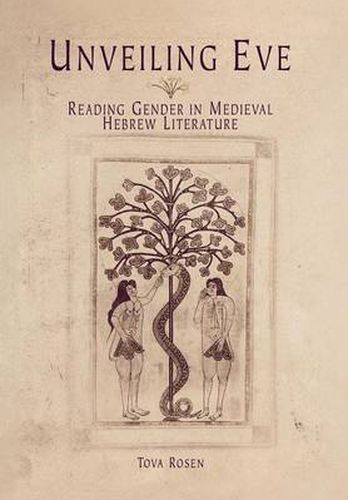Readings Newsletter
Become a Readings Member to make your shopping experience even easier.
Sign in or sign up for free!
You’re not far away from qualifying for FREE standard shipping within Australia
You’ve qualified for FREE standard shipping within Australia
The cart is loading…






This title is printed to order. This book may have been self-published. If so, we cannot guarantee the quality of the content. In the main most books will have gone through the editing process however some may not. We therefore suggest that you be aware of this before ordering this book. If in doubt check either the author or publisher’s details as we are unable to accept any returns unless they are faulty. Please contact us if you have any questions.
Selected by Choice magazine as an Outstanding Academic Title
Unveiling Eve is the first feminist inquiry into the Hebrew poetry and prose forms cultivated in Muslim and Christian Spain, Italy, and Provence in the eleventh through fourteenth centuries. In the Jewish Middle Ages, writing was an exclusively male competence, and textual institutions such as the study of scripture, mysticism, philosophy, and liturgy were men’s sanctuaries from which women were banished. These domains of male expertise-alongside belles lettres, on which Rosen’s book focuses-served as virtual laboratories for experimenting with concepts of femininity and masculinity, hetero- and homosexuality, feminization and virilization, transvestism and transsexuality. Reviewing texts as varied as love lyric, love stories, marriage debates, rhetorical contests, and liturgical and moralistic pieces, Tova Rosen considers the positions and positioning of female figures and female voices within Jewish male discourse.
The idolization and demonization of women present in these texts is read here against the background of scripture and rabbinic literature as well as the traditions of chivalry and misogyny in the hosting Islamic and Christian cultures. Unveiling Eve unravels the literary evidence of a patriarchal tradition in which women are routinely rendered nonentities, often positioned as abstractions without bodies or reified as bodies without subjectivities. Without rigidly following any one school of feminist thinking, Rosen creatively employs a variety of methodologies to describe and assess the texts’ presentation of male sexual politics and delineate how women and concepts of gender were manipulated, fictionalized, fantasized, and poeticized. Inaugurating a new era of critical thinking in Hebrew literature, Unveiling Eve penetrates a field of medieval literary scholarship that has, until now, proven impervious to feminist criticism.
$9.00 standard shipping within Australia
FREE standard shipping within Australia for orders over $100.00
Express & International shipping calculated at checkout
This title is printed to order. This book may have been self-published. If so, we cannot guarantee the quality of the content. In the main most books will have gone through the editing process however some may not. We therefore suggest that you be aware of this before ordering this book. If in doubt check either the author or publisher’s details as we are unable to accept any returns unless they are faulty. Please contact us if you have any questions.
Selected by Choice magazine as an Outstanding Academic Title
Unveiling Eve is the first feminist inquiry into the Hebrew poetry and prose forms cultivated in Muslim and Christian Spain, Italy, and Provence in the eleventh through fourteenth centuries. In the Jewish Middle Ages, writing was an exclusively male competence, and textual institutions such as the study of scripture, mysticism, philosophy, and liturgy were men’s sanctuaries from which women were banished. These domains of male expertise-alongside belles lettres, on which Rosen’s book focuses-served as virtual laboratories for experimenting with concepts of femininity and masculinity, hetero- and homosexuality, feminization and virilization, transvestism and transsexuality. Reviewing texts as varied as love lyric, love stories, marriage debates, rhetorical contests, and liturgical and moralistic pieces, Tova Rosen considers the positions and positioning of female figures and female voices within Jewish male discourse.
The idolization and demonization of women present in these texts is read here against the background of scripture and rabbinic literature as well as the traditions of chivalry and misogyny in the hosting Islamic and Christian cultures. Unveiling Eve unravels the literary evidence of a patriarchal tradition in which women are routinely rendered nonentities, often positioned as abstractions without bodies or reified as bodies without subjectivities. Without rigidly following any one school of feminist thinking, Rosen creatively employs a variety of methodologies to describe and assess the texts’ presentation of male sexual politics and delineate how women and concepts of gender were manipulated, fictionalized, fantasized, and poeticized. Inaugurating a new era of critical thinking in Hebrew literature, Unveiling Eve penetrates a field of medieval literary scholarship that has, until now, proven impervious to feminist criticism.